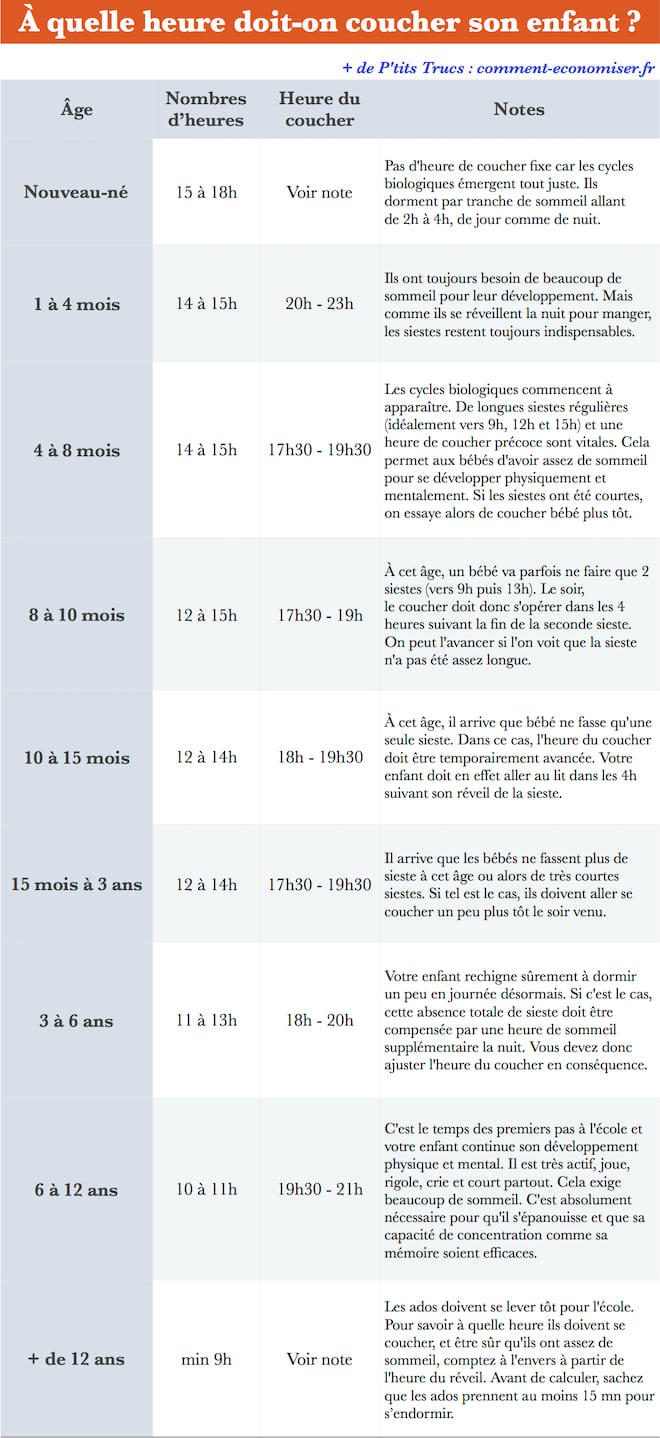
Sleep is fundamental to our health and well-being.
But, depending on our age, we don't have the same needs.
Both bedtime and sleep duration change.
To have a restful sleep, it is essential to go to bed at the right time and for a sufficient duration .
This is true for adults, but also — and especially — for children!
The problem is that we don't necessarily know what time we should put our children to bed...
Fortunately, here is the practical guide to know what time to go to bed for your child according to his age . Watch:

To print this guide in PDF version, click here.
Obviously, all children are different and you know when yours has had enough sleep (or not).
The problem is that we sometimes think "if my child stays up late at night, that's okay, he'll just sleep in later tomorrow morning...".
This often happens for our teenagers, who always want to postpone bedtime.
Mistake... Here's what happens to our children when they go to bed too late :
Once your child is past their "natural time range" of sleep, their body will produce adrenaline and a steroid hormone called cortisol.
These 2 hormones will stimulate his body instead of helping him fall asleep.
You may have already noticed that by putting him to bed later than usual, he suddenly becomes very excited, becomes agitated or even cries...
He is not ready to sleep at all, precisely because of the production of these hormones.
When a child goes to bed too late, their sleep will never be as restful as normal.
He will probably wake up one or more times during the night.
This is also explained here by the fact that his body produces cortisol...
It may sound weird, but it's true:the later you put your child to bed, the more likely they are to wake up early.
This is due to all these biological disorders in his body that prevent him from fully enjoying a good night's sleep.
Scientific studies have shown that children who go to bed late end up accumulating fewer hours of sleep than those who go to bed earlier.
This proves that a child who goes to bed late never "makes up" the hours of sleep by getting up later or taking naps during the day...
It is therefore very important to know at what time and for how long on average your baby or child should sleep.
- 15 to 18 hours of sleep
- No fixed bedtime, as biological cycles are just emerging.
They often sleep in blocks ranging from 2 to 4 hours, day and night.
- 14 to 15 hours of sleep
- Bedtime between 8 p.m. and 11 p.m.
These babies still need plenty of sleep for their development.
But since they wake up at night to eat, naps are always essential.
- 14 to 15 hours of sleep
- Bedtime between 5:30 p.m. and 7:30 p.m.
Biological cycles begin to appear.
Regular long naps (ideally around 9 a.m., 12 p.m. and 3 p.m. for example) and an early bedtime become essential.
This allows babies to get enough sleep to develop physically and mentally.
If the naps were short during the day, then we try to put the baby to bed earlier...
- 12 to 15 hours of sleep
- Bedtime between 5:30 p.m. and 7 p.m.
At this age, a baby will sometimes only take 2 naps (around 9 a.m. then 1 p.m.).
In the evening, bedtime must therefore take place within 4 hours of the end of the second nap.
We can bring it forward if we see that the nap was not long enough.
- 12 to 14 hours of sleep
- Bedtime between 6 p.m. and 7:30 p.m.
At this age, babies may only take one afternoon nap.
In this case, bedtime should be temporarily advanced.
Your child must go to bed within 4 hours of waking up from a nap.
- 12 to 14 hours of sleep
- Bedtime between 5:30 p.m. and 7:30 p.m.
It sometimes happens that babies no longer take naps at this age or have very short naps.
If this is the case, they should go to bed a little earlier in the evening.
- 11 to 13 hours of sleep
- Bedtime between 6 p.m. and 8 p.m.
Your child is probably reluctant to sleep a little during the day now.
If so, this total absence of a nap must be compensated for by an extra hour of sleep at night.
So you should adjust the bedtime accordingly.
- 10 to 11 hours of sleep
- Bedtime between 7:30 p.m. and 9 p.m.
It is the time of the first steps in school and, at this age, your child continues his physical and mental development.
At the same time, he is very active, playing, laughing, shouting and running around...
So it requires a lot of sleep. It is absolutely necessary for him to flourish at school and for his ability to concentrate and his memory to be effective.
- 9 hours (or more) of sleep
- The bedtime is to be adapted according to his schedule.
Many teenagers have to get up early to go to school. To know what time they should go to bed, and to be sure they'll get enough sleep, count backwards from the time they wake up.
Before calculating this ideal time, be aware that teenagers take at least 15 minutes to fall asleep.
And often more when they have a lot on their minds.